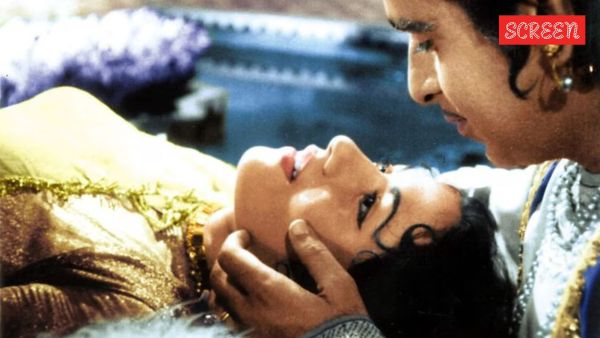Stars are often seen from afar. Glowing points of light that never truly touch us, yet leave an imprint on the night sky. Madhubala belongs to that realm. For many, she is less a person than a legend. Distant, radiant, and untouchable. “She was always warm and friendly,” Lata Mangeshkar once said, “though everyone stressed on her breath-taking beauty, she never took her looks seriously.” This delicate balance between myth and reality is what keeps Madhubala’s story alive. Behind the dazzling image that captivated millions, Madhubala’s life resembled a script full of hardship and heartbreak. Called Bollywood’s Marilyn Monroe, her radiant screen presence was far removed from the private struggles she endured. It is a cruel irony that a woman who reigned over the hearts of the Indian subcontinent was herself shattered by love more times than most can count.
Her beauty often overshadowed her craft, yet those who knew her recognized something deeper. Shammi Kapoor recalled how he was unable to remember his lines on their first meeting: “She was fully aware of the effect she had been having on me and was relishing it thoroughly.” Dilip Kumar, her most famous love, described her allure as “irresistible.” These personal recollections form the backbone of the stories that surround Madhubala, stories that have taken on a life of their own. Before Dilip, there was Latif, her childhood friend, who reportedly still places a rose on her grave every year on the day she died. Then Prem Nath, whose relationship with Madhubala ended over religious differences, leaving scars that would never heal. Prem Nath’s wife later revealed how Madhubala’s distress over their marriage marked the beginning of her health deterioration.
 Dilip Kumar and Madhubala’s tragic love story has been etched in legend.
Dilip Kumar and Madhubala’s tragic love story has been etched in legend.
Also Read | Kishore Kumar said he was ‘never in love’ with Madhubala: ‘Doctors told her you can’t have sex, children’
The nine years Madhubala spent with Dilip Kumar ended not because of opposition from her father, Atallulah Khan, as commonly believed, but due to a clash of ideals. Dilip wrote in his biography that Ataullah Khan wanted to control their careers as a business venture, but he refused to be part of it. Madhubala tried to convince Dilip, promising reconciliation, but he was firm: “I explained to both of them that I had my own way of functioning and selecting projects and I would not show any laxity even if it were my own production house.” Her sister, Madhur Bhushan, described the heartbreak as a slow unravelling: “Leave your father and I’ll marry you.’ She’d say, ‘I’ll marry you but just come home, say sorry and hug him.’” Though they never reunited, Madhubala held no bitterness. “He’s got married to a very pretty girl. She’s so devoted. I’m very happy for him,” her sister recalled her saying, even as a deep emptiness remained.
In her last years, Madhubala was frail, confined to her bed, and exhausted by illness and sorrow. She married Kishore Kumar and they were together for nine years but their union was far from happy. It is said that Kishore left her alone at her father’s house in the later years. He took her to England for a consultation with doctors who said that her heart was gone and she won’t live long. Kishore said in an interview to Illustrated Weekly of India, “I knew she was very sick even before I married her. But a promise is a promise. So I kept my word and brought her home as my wife, even though I knew she was dying from a congenital heart problem. For nine long years, I nursed her. I watched her die before my own eyes. You can never understand what this means until you live through this yourself.”
The woman who once lit up the screen with electrifying presence spent her final days in silence and suffering. Her story is not just one of glamour, but of a remarkable human being caught between dreams and reality, adored yet deeply vulnerable. Dilip Kumar also recalled her last meeting with Madhubala before she died at 36. “Soon after our nikah (marriage with Saira Banu), while we were staying in Madras, I received a message from Madhubala that she wished to see me urgently. I confided in Saira as soon as we returned to Bombay about the message. Saira Banu at once insisted that I should meet Madhu since it must be something she was distressed about.”
He recalled her health at the time in his memoirs, “When I went to Madhu’s home, I was pained to see that she was frail and looked very weak. The pallor on her face not only belied her ill health, but her magnificent, impish smile seemed such an effort. She was happy to see me and said: ‘Hamarey shehzade ko unki shehzadi mil gayi hai, main bahut khush hoon!’ (Our prince has got his princess, I am very happy!).”


